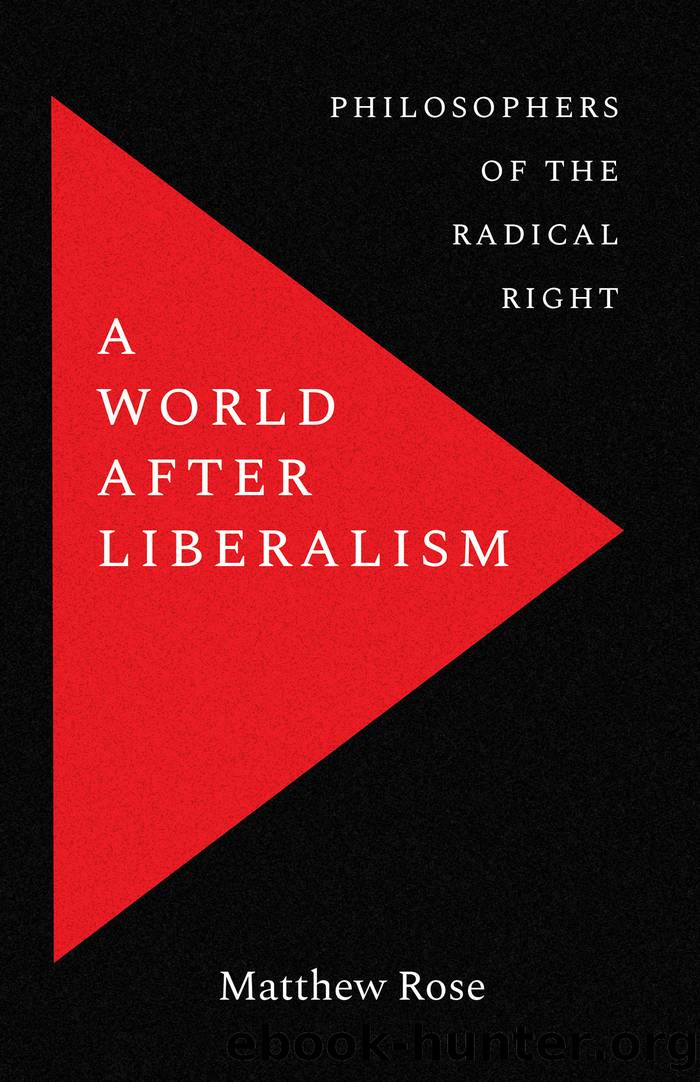A World after Liberalism by Matthew Rose

Author:Matthew Rose
Language: eng
Format: epub
Publisher: Yale University Press
Published: 2021-09-15T00:00:00+00:00
AntiâAnti-Racism
Nothing has done more to marginalize Benoist in French intellectual life than his positions, stated or suspected, on race. He bears the lasting stigma of early writings, published under a pseudonym, in which he espoused racist views. âThe objective study of history,â he wrote in 1966, âshows that only the European race has continued to progress since it appeared, contrary to races stagnant in their development.â38 Benoist later repented of his chauvinism, as well as for his support for European colonialism, but he maintained professional connections with racist thinkers well into the next decade. His correspondence includes a revealing exchange, over a five-year period, with a leading American white supremacist and anti-Semite (who shared Benoistâs admiration for Yockey).39
Although Benoist has publicly disavowed racist ideas for more than three decades, an ambiguity lingers. His writings are often published and translated by small presses with controversial catalogues, and he is known to affiliate with groups with reputations for promoting ethno-nationalism. Across Europe, a network of small magazines and study circles on the far right take inspiration from his writing, and he remains ambiguously active in their work.40 He is usually careful to note that he dissents from their views on race, as he did in a 2013 address to a white nationalist conference in the United States. But his talk of the importance of âgenetic tiesâ and âcarnal homelandsâ clearly resonates with a new generation of white nationalists, who are eager to claim him as an ally.41
Is Benoist a racist? The question is fair, and its answer depends on the definition of the term. If racism means a belief in the inherent supremacy or inferiority of a racial group, Benoist is innocent of the charge, though for idiosyncratic reasons. The problem with racial supremacism is not that it offends racial equality. Benoist, as we will see, rejects egalitarian doctrines too. The problem is that it promotes a form of universalism. To assert that one race is superior in some qualitative respect is to adopt a universal measurement. But because Benoist denies that any such perspective existsâthere are no neutral points of view, only the interpretations from within a given cultureâhe also denies that any racial group can be considered inherently better or worse than another. âThe concept of the superiority of one nation, one people, one race, or one civilization is absurd,â he cautions.42
If racism instead means the belief that race is the primary element in human history, or the determinant of an individualâs worth, then Benoist is not a racist either. Though he has shown a curiosity about antiquated forms of racial science, he argues that its views of race are reductive. Race is not a biological âessenceâ or a theoretical category that can plausibly explain individual or group behavior by itself. To posit a âmechanisticâ relationship between race and behavior, he argues, is to make a profound anthropological error.43 The defining characteristic of human beings is not their genotype or phenotype. It is their culture-making capacity. Benoist is in this
Download
This site does not store any files on its server. We only index and link to content provided by other sites. Please contact the content providers to delete copyright contents if any and email us, we'll remove relevant links or contents immediately.
What's Done in Darkness by Kayla Perrin(25501)
Shot Through the Heart: DI Grace Fisher 2 by Isabelle Grey(18220)
Shot Through the Heart by Mercy Celeste(18160)
The Fifty Shades Trilogy & Grey by E L James(17777)
The 3rd Cycle of the Betrayed Series Collection: Extremely Controversial Historical Thrillers (Betrayed Series Boxed set) by McCray Carolyn(13189)
The Subtle Art of Not Giving a F*ck by Mark Manson(12915)
Scorched Earth by Nick Kyme(11833)
Stepbrother Stories 2 - 21 Taboo Story Collection (Brother Sister Stepbrother Stepsister Taboo Pseudo Incest Family Virgin Creampie Pregnant Forced Pregnancy Breeding) by Roxi Harding(11040)
Drei Generationen auf dem Jakobsweg by Stein Pia(10217)
Suna by Ziefle Pia(10186)
Scythe by Neal Shusterman(9263)
International Relations from the Global South; Worlds of Difference; First Edition by Arlene B. Tickner & Karen Smith(8613)
Successful Proposal Strategies for Small Businesses: Using Knowledge Management ot Win Govenment, Private Sector, and International Contracts 3rd Edition by Robert Frey(8419)
This is Going to Hurt by Adam Kay(7697)
Dirty Filthy Fix: A Fixed Trilogy Novella by Laurelin Paige(6454)
He Loves Me...KNOT by RC Boldt(5805)
How to Make Love to a Negro Without Getting Tired by Dany LaFerrière(5378)
Interdimensional Brothel by F4U(5305)
Thankful For Her by Alexa Riley(5163)
